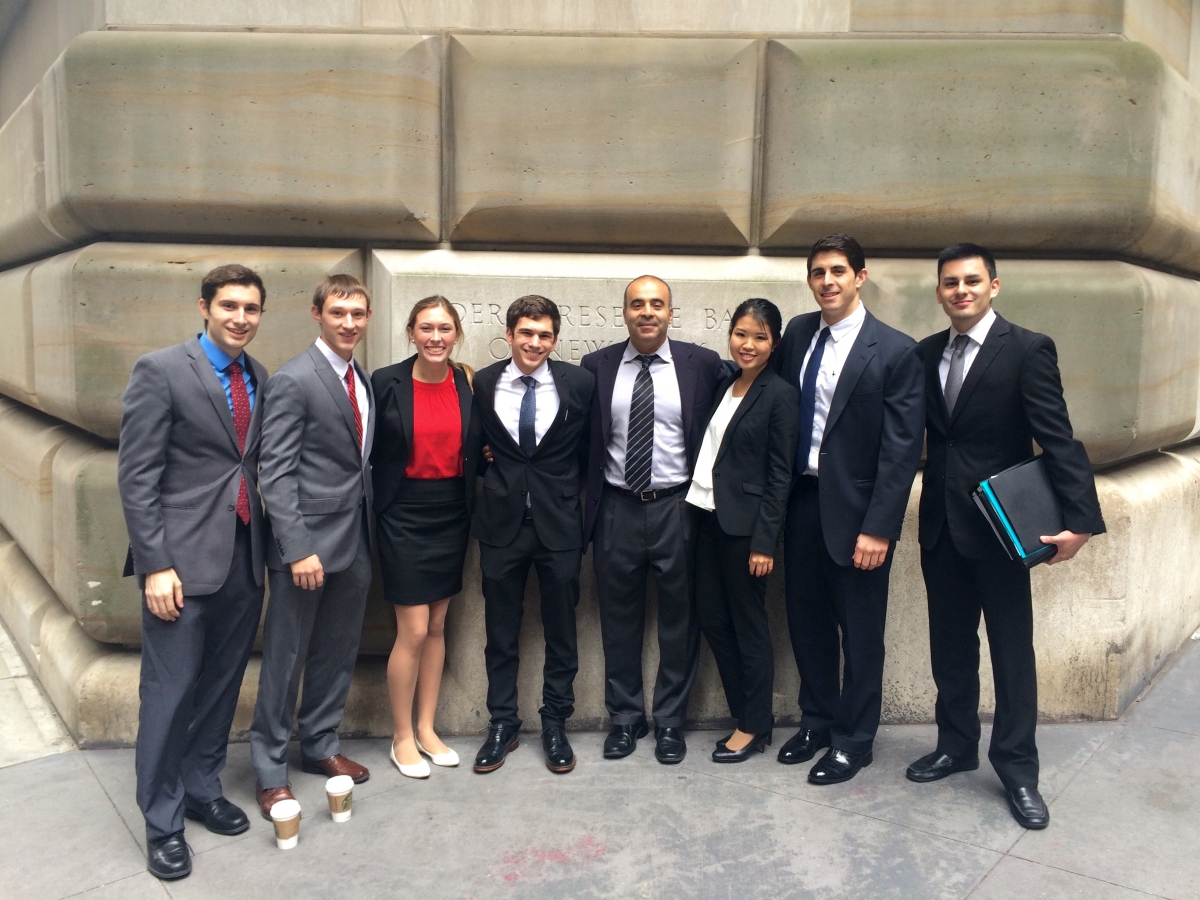When Federal Reserve System Board of Governors Chair Janet Yellen makes an announcement, the market listens. Therefore, understanding the Federal Reserve Bank and its monetary policies are crucial skills for future financial professionals.
That’s why, for the fourth consecutive year, Hany Guirguis, Ph.D., professor of economics and finance, led and mentored, a team of School of Business students who participated in the New York College Fed Challenge. This academic competition, sponsored by the Federal Reserve Bank of New York, encourages students to learn about the U.S. economy, monetary policymaking and the role of the Federal Reserve System.
“Today, you cannot survive in the financial market without a strong comprehension of non-traditional monetary policy and how it affects the price of different financial assets,” says Guirguis. “Right now the Federal Reserve Bank is a big player in the financial market due to all the assets they’ve purchased. In addition, the impact of the Fed future exit policy is felt far beyond the United States financial market. Thus, monetary policy is an important component of our students’ education.”
Defining the Competition
Administered by a panel of professional economists, the competition is held at the Federal Reserve Bank of New York. The competition consists of a lightening-fast presentation followed by a question-and-answer session wherein students answer questions related to finance, economics, banking and monetary policy. To prepare, students research and analyze current economic data, review potential future economic risks and develop a forecasting model for such risks.
The members of this year’s team are Joshua Clark ’15, William Gerard ’15, David Lothrop ’15, Riko Mochizuki ’16, Jessica Schutte ’15 and John Trieste ’16. The team advanced to the semi-finals of this year’s competition – an achievement attained by only 9 of the 36 colleges and universities that participated. During the competition finals, the team earned nearly perfect scores, and received the competition’s Honorable Mention Award.
For Joshua Clark, an economics major who served as team leader, the most challenging aspect of the competition was conducting the vast amount of original research and data analysis — something that not every team did in preparation for the competition.
“Instead of pulling pre-existing data from the Internet, we broke into small groups to do our own analysis and make our own graphs,” says Clark, noting that he is grateful Guirguis encouraged the team to go the extra mile.
“Besides being incredibly knowledgeable on monetary policy, Dr. Guirguis pushes his students to do things that they wouldn’t be able to do, or wouldn’t want to do otherwise,” Clark says. “He just has a really good way of getting the most out of his students.”
Building a Team
Guirguis, an expert in econometrics, financial modeling and macroeconomics, joined Manhattan College in 2000. He regularly publishes in a variety of scholarly journals including the Journal of derivatives, Journal of Real Estate Finance and Economics, European Financial Management, and Applied Financial Economics.
Upon finishing his doctorate in economics from the University of Oregon, Guirguis elected to follow his true passion: teaching, rather than pursue a career in industry.
“Teaching provides a very rewarding experience - you can witness the impact of your work, we are instilling students with an education, a career, a life,” he says.
In addition to his full-time research and teaching schedule, Guirguis recruits Fed College Challenge team members from his Advanced Macroeconomics, Econometrics and Financial Modeling courses. He mentors the team members and provides insight on industry fundamentals. Guirguis believes the experience helps his top students become responsible leaders who understand how to effectively create and apply financial models. In addition, it also helps the students realize some of their untapped potential.
“Our students compete against some of the best students in the nation, and the material covered in the competition goes far beyond the undergraduate syllabi,” Guirguis says. “In terms of communication skills, preparation, confidence and exposure to specialists and professionals in the field, the experience is priceless.”
